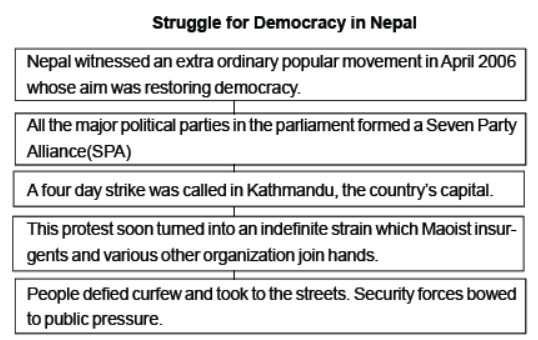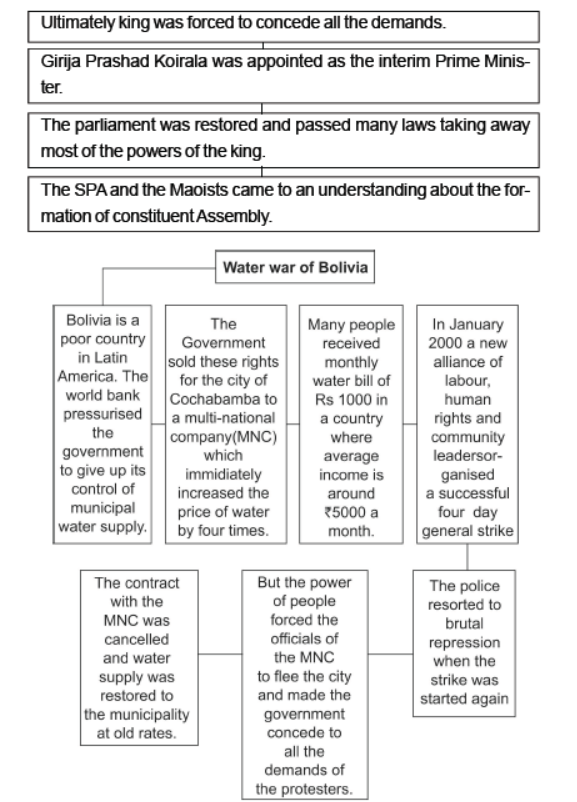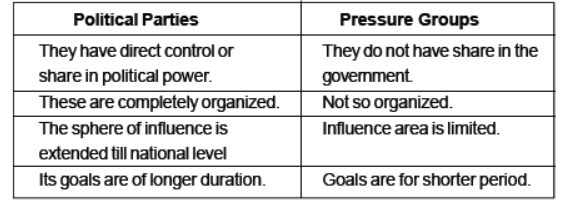Read and download the CBSE Class 10 Social Science Popular Struggles and Movements VBQs. Designed for the 2025-26 academic year, these Value Based Questions (VBQs) are important for Class 10 Social Science students to understand moral reasoning and life skills. Our expert teachers have created these chapter-wise resources to align with the latest CBSE, NCERT, and KVS examination patterns.
VBQ for Class 10 Social Science Democratic Politics II Chapter 5 Popular Struggles and Movements
For Class 10 students, Value Based Questions for Democratic Politics II Chapter 5 Popular Struggles and Movements help to apply textbook concepts to real-world application. These competency-based questions with detailed answers help in scoring high marks in Class 10 while building a strong ethical foundation.
Democratic Politics II Chapter 5 Popular Struggles and Movements Class 10 Social Science VBQ Questions with Answers
Popular Struggle and Movement
Points to Remember:
Story of Nepal
- In the decade of 1990s democracy was established in Nepal.
- Although the king formally remained the head of the state the real power was exercised by popularly elected representatives. After the mysterious massacre of the Nepal royal family in 2001 King Gyanendra was not prepared to accept the democratic rule. In February 2005 the king dismissed the then Prime Minister and dissolve the Parliament.
Struggle for Democracy in Nepal


Similarities and Difference between Struggle for Democracy in Nepal & Water war of Bolivia The objective of these two popular struggles in Nepal and Bolivia was different. While the movement in Nepal was to establish democracy, in Bolivia it involved claims on the elected democratic government. The popular struggle in Bolivia was about one specific policy but the Struggle in Nepal was about the foundations of country’s politics. But there were some common striking features also. Like both are instances of political conflict that led to popular struggle. In both cases the struggle involved mass mobilization and finally both instances involved critical role of political organizations.
Thus from these two examples we can draw some common conclusion-
- Democracy evolves through popular struggles. It is possible that some significant decisions may take place through consensus and may not involve any conflict at all. But that would be an exception.
Defining moments of democracy usually involve conflict between those groups who have exercised power and those who aspire for a share in power.
- Democratic conflict is resolved through mass mobilization.
Sometimes it is possible that the conflict is resolved by using the existing institutions like the parliament or the judiciary. But when there is a deep dispute, very often these institutions themselves get involved in the dispute. The resolution has to come from outside, from the people.
- These conflicts and mobilizations are based on new political organizations. True there is an element of spontaneity in all such historic moments. But the spontaneous public participation becomes effective with the help of organized politics.
- There can be many agencies of organized politics. These include political parties, pressure groups and movement groups.
1. Pressure Groups- These are the organizations that attempt to influence government politics. For examples- All India farmers Association,All India Trade Union etc.
2. FEDECOR- The organization which led the water revolution in Bolivia.
It comprised of local professionals including engineers and environmentalists and were supported by federations of farmers and confederations of factory workers’ union, middle class students and city’s growing population of homeless street children.
Working of Pressure Groups
- They try to gain public support and sympathy for their goals and their activity by carrying out information campaigns, organizing meetings, file petitions etc.
- They often organize protest activity like strikes or disrupting government programmes in order to force the government to take note of their demands.
- Participate in official bodies and committees that offer advice to the government.
- Act as an extended arm of political parties.
- Sometimes political parties grow out of movements.
- In most cases the relationship between parties and interest groups is not so direct
MCQs
Question. Name the groups which are formed to promote their interests.
(a) Pressure groups
(b) Political party
(c) Interest groups
(d) Movements
Answer : C
Question. When was the popular movement started in Nepal ?
(a) April, 2006
(b) June, 2005
(c) August, 1947
(d) March, 2016
Answer : A
Question. Name the groups which try to influence government policies.
(a) Movement groups
(b) Pressure groups
(c) Sectional groups
(d) None of these
Answer : B
Question. What was the main issue for popular struggle in Bolivia ?
(a) Water bills
(b) Poverty
(c) Racial discrimination
(d) None of these
Answer : A
Question. What is the capital of Nepal ?
(a) Mayanmar
(b) Delhi
(c) Kathmandu
(d) Kulalumpur
Answer : C
Question. What is Narmada Bachao Andolan ?
(a) Interest group
(b) Political party
(c) Pressure group
(d) Movement group
Answer : D
Question. Which among the following is the special feature that distinguishes a pressure group from a political party?
(a) Parties take political stances, while pressure groups do not bother about political issues.
(b) Pressure groups are confined to a few people, while parties involve larger number of people.
(c) Pressure groups do not seek to get into power, while political parties do.
(d) Pressure groups do not seek to mobilise people, while parties do.
Answer : C
True/False
Question. King Birendra was killed in the mysterious massacre of 2001 in Nepal. (True/False)
Answer : True
Question. Socialist party led Bolivia water war. (True/False)
Answer : False.
Very Short Answer Type Questions
Question. What was the cause of water revolution of Bolivia?
Answer. Against privatization of water in Bolivia.
Question. In April 2006 an extraordinary popular movement was organized in Nepal. What was its aim?
Answer. To restore Democracy,
Question. When was democracy established in Nepal?
(a) 1890
(b) 1900
(c) 1990
(d) 2000
Answer. C
Question. Name the group which tries to influence the policies of the government?
Answer. Pressure groups
Question. Write one similarity between the democratic movement of Nepal and Water revolution of Bolivia.
Answer. Mobilization of people.
Question. Public movement is an integral part of the functioning of democracy.
Write an example of any public movement.
Answer. Water revolution of Bolivia
Question. An assertion (A) and its reason (B) is given below. Read the following statements and choose the right answer from the options given below.
Assertion (A): In April 2006 a popular struggle started in Nepal.
Reasoning (R): King Gyanendra dismissed the parliament.
(a) Both A and R are correct and R is the correct explanation of A
(b) Both A and R are correct but R is the not the correct explanation of A
(c) A is correct but R is incorrect
(d) R is correct but A is incorrect
Answer. A
Short Answer Type Questions:
Question. In what ways do pressure groups and movements exert influence on politics?
Answer : Pressure groups and movements exert influence on politics in a variety of ways.
- They try to gain public support and sympathy for their cause by carrying out information campaigns, organising meetings, filing petitions, etc.
- By organising strikes and disruptions, they seek to make the government take note of their demands.
- They also influence decision-making by lobbying.
- The issues raised by them often influence the policies of political parties.
Question. Explain how the activities of pressure groups are useful in the functioning of a democratic government.
Answer : Pressure groups help in the deepening of democracy. As long as everyone gets the opportunity, putting pressure on the rulers is not an unhealthy activity in a democracy.
Governments can often come under undue pressure from a small group of rich and powerful people. Pressure groups perform a useful role of countering this undue influence of reminding the government of the needs and concerns of ordinary citizens.
Question. What is the difference between a pressure group and a political party?
Answer : A pressure group is an organised or an unorganised body that tries to promote its interests. They fight and try to achieve a common objective. Political parties contest elections because their aim is to achieve political power. They have more than one interests, they have their own ideology. They represent various interests and have their own way of
achieving their aims.
Question. Match List I with list II and select the correct answer using the codes given below the lists:
| List I | List II |
| 1. Pressure group | Α. Narmada Bachao Andolan |
| 2. Long-term movement | Β. Asom Gana Parishad |
| 3. Single issue movement | C. Women’s Movement |
4. Political party | D. Fertilizer dealers’ association |
| 1 | 2 | 3 | 4 | |
| (a) | D | C | A | B |
| (b) | B | A | D | C |
| (c) | C | D | B | A |
| (d) | B | D | C | A |
Answer : 1 2 3 4
(a) D C A B
Question. Distinguish between sectional interest groups and public interest groups .
Answer : 1) Promotes particular interest. Aims betterment of the members, not society in general. Example - Trade unions.
2) Promotes general interest. Concern with social justice and social equality for the entire society. Example – Feminist movement.
Question. What values must the followers possess to achieve their goal
Answer :
1) Personal responsibility
2) Teamwork
3) Self discipline
4) Independence.
Question. What is the role of FEDECOR in fighting against water war in Bolivia?
Answer : 1) They represent common or general interest
2) Comprises of local professionals
3) Supported by socialist party.
Question. What values do we learn from it?
Answer :
1) Teamwork
2) Unified participation
3) Interdependence
4) Self discipline
Question. “Pressure groups are the main dragging force in a democracy”. Comment.
Answer : 1) Influence government policies
2) It deepens the democracy
3) They do not get fun and support from the people.
Question. What values do these groups imbibe in democracy?
Answer :
1) Interdependence
2) Unity
3) Social interest
4) Patriotism
Question. Karnataka pulp wood was a company established by the government of Karnataka. How did the people react to this?
Answer : 1) People started a movement “Kittiko Hachchik ” in 1987.
2) Non-violent protest
3) Planted saplings useful to the people.
Question. Give an account of the valuable steps taken by them.
Answer :
1) Popular participation
2) Independent society
3) Teamwork.
Question. The struggle of Nepali people is a source of inspiration to democrats all over the world. Explain.
Answer : 1) Mass struggle for democracy was launched by SPA and Maoists
2) Demand for restoration of democracy through strike by SPA
3) Formation of interim government.
Question. What values are bought out through their struggle?
Answer :
1) Patriotism
2) Unity
3) Independence
4) Social interest
Question. “Sometimes political parties grow out of movement “.Give examples.
Answer : 1) Assam movement lead by students against the ‘Foreigners’ lead to Asom Gana Parishad
2) The routes of parties like AIDMK and DMK
3) Aam Adhmi by Aravind Kezriwal.
Question. What values make these movements to become a healthy political party?
Answer :
1) Teamwork
2) Respect for power
3) Self discipline
4) Concern for people.
Question. In what ways do pressure groups and movements exert influence on politics?
Answer : 1) Gain public support and sympathy
2) Organise protest activity
3) Use of professional lobbyist.
Question. What values make these groups to have healthy influence?
Answer :
1) Honesty
2) Self-discipline
3) Teamwork and collaborate leadership
4) Concern for people
5) Responsible behavior.
Assertion and Reasoning Based Questions
Mark the option which is most suitable :
(a) If both assertion and reason are true and reason is the correct explanation of assertion.
(b) If both assertion and reason are true and reason is not the correct explanation of assertion.
(c) If assertion is true and reason is false.
(d) If both assertion and reason are false.
Question. Assertion : In 1984, the Karnataka government set up a company called Karnataka Pulpwood Limited.
Reason : The company began to plant eucalyptus trees on this land, which could be used for making paper pulp.
Answer : (b) The reason and assertion are both true but the reason does not justify the assertion.
Question. Assertion : Interest groups seek to promote the interests of a particular section or group of society.
Reason : They are sectional because they represent a section of society: workers, employees, businesspersons, industrialists, followers of a religion, caste group, etc.
Answer : (a) The principal concern of these interest groups is the betterment and well-being of their members, not society in general. Thus, the reason and assertion are both true and the reason explains the assertion completely.
Question. Assertion : The story of Poland applies to the struggle for establishing or restoring democracy.
Reason : Democracy evolves through popular struggles.
Answer : (b) Defining moments of democracy usually involve conflict between those groups who have exercised power and those who aspire for a share in power.
The assertion and reason are both true but the reason is not the correct explanation of the assertion.
Please refer to attached file for CBSE Class 10 Social Science Popular Struggles and Movements VBQs
| CBSE Class 10 Social Science Resources and Development VBQs |
| CBSE Class 10 Social Science Forest and Wildlife Resources VBQs |
| CBSE Class 10 Social Science Water Resources VBQs |
| CBSE Class 10 Social Science Agriculture VBQs |
| CBSE Class 10 Social Science Mineral and Energy Resources VBQs in Hindi |
| CBSE Class 10 Social Science Minerals and Energy Resources VBQs |
| CBSE Class 10 Civics Manufacturing Industries VBQs |
| CBSE Class 10 Social Science Manufacturing industry VBQs in Hindi |
| CBSE Class 10 Social Science Life Lines of National Economy VBQs in Hindi |
| CBSE Class 10 Social Science Lifelines of National Economy VBQs |
| CBSE Class 10 Social Science Power Sharing VBQs |
| CBSE Class 10 Social Science Federalism VBQs |
| CBSE Class 10 Social Science Gender Religion and caste VBQs |
| CBSE Class 10 Social Science Political Parties VBQs |
| CBSE Class 10 Social Science Political party VBQs in Hindi |
| CBSE Class 10 Social Science Outcomes of Democracy VBQs |
| CBSE Class 10 Social Science Results of Democracy VBQs in Hindi |
| CBSE Class 10 Social Science The Rise Of Nationalism In Europe VBQs |
| CBSE Class 10 Social Science The Rise of Nationalism in Europe VBQs in Hindi |
| CBSE Class 10 Social Science Nationalism in India VBQs |
| CBSE Class 10 Social Science Nationalism in India VBQs in Hindi |
| CBSE Class 10 Social Science The Making of a Global World VBQs |
| CBSE Class 10 Social Science The Age of Industrialization VBQs |
| CBSE Class 10 Social Science Print Culture and the Modern World VBQs |
| CBSE Class 10 Social Science Development VBQs |
| CBSE Class 10 Social Science Sectors of the Indian Economy VBQs |
| CBSE Class 10 Economics Money And Credit VBQs |
| CBSE Class 10 Social Science Currency and credit VBQs in Hindi |
| CBSE Class 10 Social Science Globalization and Indian Economy VBQs |
| CBSE Class 10 Social Science Globalization and Indian Economy VBQs in Hindi |
| CBSE Class 10 Economics Consumer Rights VBQs |
| CBSE Class 10 Social Science Consumer Rights VBQs in Hindi |
Important Practice Resources for Class 10 Social Science
VBQs for Democratic Politics II Chapter 5 Popular Struggles and Movements Class 10 Social Science
Students can now access the Value-Based Questions (VBQs) for Democratic Politics II Chapter 5 Popular Struggles and Movements as per the latest CBSE syllabus. These questions have been designed to help Class 10 students understand the moral and practical lessons of the chapter. You should practicing these solved answers to improve improve your analytical skills and get more marks in your Social Science school exams.
Expert-Approved Democratic Politics II Chapter 5 Popular Struggles and Movements Value-Based Questions & Answers
Our teachers have followed the NCERT book for Class 10 Social Science to create these important solved questions. After solving the exercises given above, you should also refer to our NCERT solutions for Class 10 Social Science and read the answers prepared by our teachers.
Improve your Social Science Scores
Daily practice of these Class 10 Social Science value-based problems will make your concepts better and to help you further we have provided more study materials for Democratic Politics II Chapter 5 Popular Struggles and Movements on studiestoday.com. By learning these ethical and value driven topics you will easily get better marks and also also understand the real-life application of Social Science.
The latest collection of Value Based Questions for Class 10 Social Science Chapter Democratic Politics II Chapter 5 Popular Struggles and Movements is available for free on StudiesToday.com. These questions are as per 2026 academic session to help students develop analytical and ethical reasoning skills.
Yes, all our Social Science VBQs for Chapter Democratic Politics II Chapter 5 Popular Struggles and Movements come with detailed model answers which help students to integrate factual knowledge with value-based insights to get high marks.
VBQs are important as they test student's ability to relate Social Science concepts to real-life situations. For Chapter Democratic Politics II Chapter 5 Popular Struggles and Movements these questions are as per the latest competency-based education goals.
In the current CBSE pattern for Class 10 Social Science, Democratic Politics II Chapter 5 Popular Struggles and Movements Value Based or Case-Based questions typically carry 3 to 5 marks.
Yes, you can download Class 10 Social Science Chapter Democratic Politics II Chapter 5 Popular Struggles and Movements VBQs in a mobile-friendly PDF format for free.

